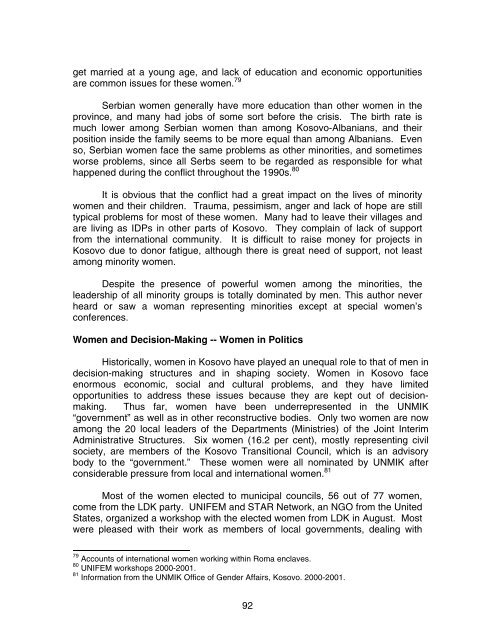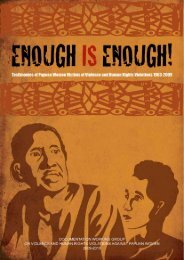The Impact of Armed Conflict on Women and Girls - UNFPA
The Impact of Armed Conflict on Women and Girls - UNFPA
The Impact of Armed Conflict on Women and Girls - UNFPA
Create successful ePaper yourself
Turn your PDF publications into a flip-book with our unique Google optimized e-Paper software.
get married at a young age, <strong>and</strong> lack <str<strong>on</strong>g>of</str<strong>on</strong>g> educati<strong>on</strong> <strong>and</strong> ec<strong>on</strong>omic opportunities<br />
are comm<strong>on</strong> issues for these women. 79<br />
Serbian women generally have more educati<strong>on</strong> than other women in the<br />
province, <strong>and</strong> many had jobs <str<strong>on</strong>g>of</str<strong>on</strong>g> some sort before the crisis. <str<strong>on</strong>g>The</str<strong>on</strong>g> birth rate is<br />
much lower am<strong>on</strong>g Serbian women than am<strong>on</strong>g Kosovo-Albanians, <strong>and</strong> their<br />
positi<strong>on</strong> inside the family seems to be more equal than am<strong>on</strong>g Albanians. Even<br />
so, Serbian women face the same problems as other minorities, <strong>and</strong> sometimes<br />
worse problems, since all Serbs seem to be regarded as resp<strong>on</strong>sible for what<br />
happened during the c<strong>on</strong>flict throughout the 1990s. 80<br />
It is obvious that the c<strong>on</strong>flict had a great impact <strong>on</strong> the lives <str<strong>on</strong>g>of</str<strong>on</strong>g> minority<br />
women <strong>and</strong> their children. Trauma, pessimism, anger <strong>and</strong> lack <str<strong>on</strong>g>of</str<strong>on</strong>g> hope are still<br />
typical problems for most <str<strong>on</strong>g>of</str<strong>on</strong>g> these women. Many had to leave their villages <strong>and</strong><br />
are living as IDPs in other parts <str<strong>on</strong>g>of</str<strong>on</strong>g> Kosovo. <str<strong>on</strong>g>The</str<strong>on</strong>g>y complain <str<strong>on</strong>g>of</str<strong>on</strong>g> lack <str<strong>on</strong>g>of</str<strong>on</strong>g> support<br />
from the internati<strong>on</strong>al community. It is difficult to raise m<strong>on</strong>ey for projects in<br />
Kosovo due to d<strong>on</strong>or fatigue, although there is great need <str<strong>on</strong>g>of</str<strong>on</strong>g> support, not least<br />
am<strong>on</strong>g minority women.<br />
Despite the presence <str<strong>on</strong>g>of</str<strong>on</strong>g> powerful women am<strong>on</strong>g the minorities, the<br />
leadership <str<strong>on</strong>g>of</str<strong>on</strong>g> all minority groups is totally dominated by men. This author never<br />
heard or saw a woman representing minorities except at special women’s<br />
c<strong>on</strong>ferences.<br />
<strong>Women</strong> <strong>and</strong> Decisi<strong>on</strong>-Making -- <strong>Women</strong> in Politics<br />
Historically, women in Kosovo have played an unequal role to that <str<strong>on</strong>g>of</str<strong>on</strong>g> men in<br />
decisi<strong>on</strong>-making structures <strong>and</strong> in shaping society. <strong>Women</strong> in Kosovo face<br />
enormous ec<strong>on</strong>omic, social <strong>and</strong> cultural problems, <strong>and</strong> they have limited<br />
opportunities to address these issues because they are kept out <str<strong>on</strong>g>of</str<strong>on</strong>g> decisi<strong>on</strong>making.<br />
Thus far, women have been underrepresented in the UNMIK<br />
“government” as well as in other rec<strong>on</strong>structive bodies. Only two women are now<br />
am<strong>on</strong>g the 20 local leaders <str<strong>on</strong>g>of</str<strong>on</strong>g> the Departments (Ministries) <str<strong>on</strong>g>of</str<strong>on</strong>g> the Joint Interim<br />
Administrative Structures. Six women (16.2 per cent), mostly representing civil<br />
society, are members <str<strong>on</strong>g>of</str<strong>on</strong>g> the Kosovo Transiti<strong>on</strong>al Council, which is an advisory<br />
body to the “government.” <str<strong>on</strong>g>The</str<strong>on</strong>g>se women were all nominated by UNMIK after<br />
c<strong>on</strong>siderable pressure from local <strong>and</strong> internati<strong>on</strong>al women. 81<br />
Most <str<strong>on</strong>g>of</str<strong>on</strong>g> the women elected to municipal councils, 56 out <str<strong>on</strong>g>of</str<strong>on</strong>g> 77 women,<br />
come from the LDK party. UNIFEM <strong>and</strong> STAR Network, an NGO from the United<br />
States, organized a workshop with the elected women from LDK in August. Most<br />
were pleased with their work as members <str<strong>on</strong>g>of</str<strong>on</strong>g> local governments, dealing with<br />
79 Accounts <str<strong>on</strong>g>of</str<strong>on</strong>g> internati<strong>on</strong>al women working within Roma enclaves.<br />
80 UNIFEM workshops 2000-2001.<br />
81 Informati<strong>on</strong> from the UNMIK Office <str<strong>on</strong>g>of</str<strong>on</strong>g> Gender Affairs, Kosovo. 2000-2001.<br />
92




![IANSA [PDF, 2MB] - PeaceWomen](https://img.yumpu.com/25206379/1/190x123/iansa-pdf-2mb-peacewomen.jpg?quality=85)
![Commitments Sample [PDF, 93KB] - PeaceWomen](https://img.yumpu.com/25206331/1/190x245/commitments-sample-pdf-93kb-peacewomen.jpg?quality=85)










![A Toolkit for Advocacy and Action [PDF, 260KB] - Peace Women](https://img.yumpu.com/25205989/1/190x245/a-toolkit-for-advocacy-and-action-pdf-260kb-peace-women.jpg?quality=85)